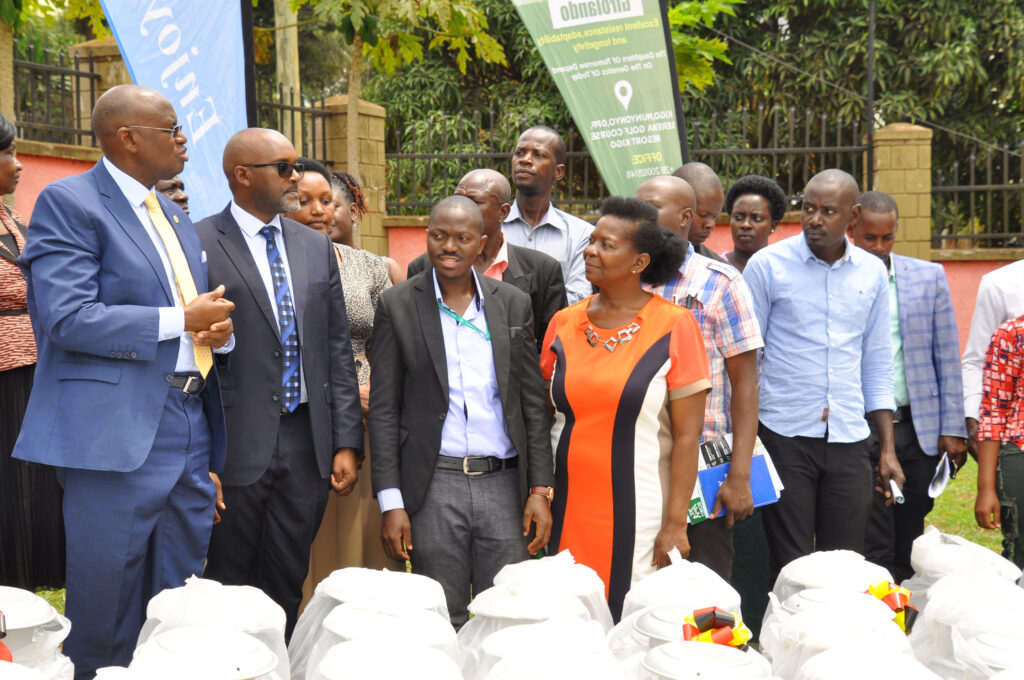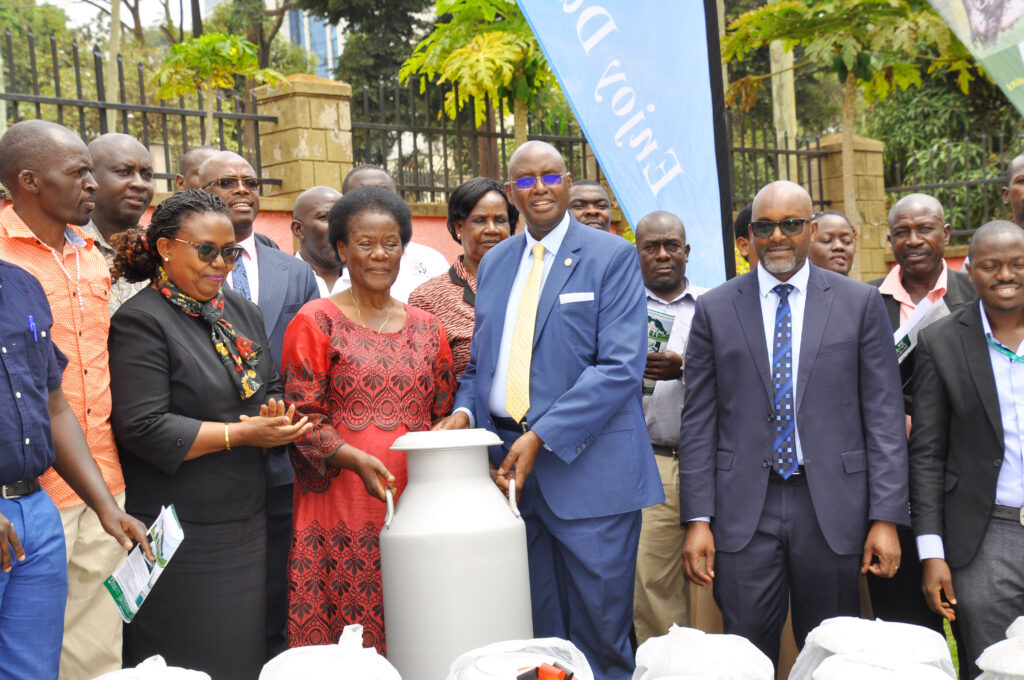By Jeff Andrew Lule
The Dairy Development Authority (DDA), has distributed improved pasture seed varieties which grow faster and are highly nutritious.
In times of a lack of pastures during dry seasons, the pastures can be turned into silage and hay, according to DDA dairy development office Christopher Ssebina.
Four co-operatives from the districts of Mukono, Wakiso, Mpigi and Kampala, received the seeds, including Rhodes grass (Chloris gayana) (100kgs), Lablab (80kgs), and Centrosema (80kgs) since early rains have started, they are able to plant.
“These pastures can be conserved as hay and silage and can be given to animals in times of scarcity. Each co-operative has received more than 20 kgs of each variety,” Ssebina said.
This was during the distribution of dairy tools and inputs to different dairy co-operatives and farmers at the DDA offices in Nakasero, Kampala on Tuesday.
“Our plan is that when they start planting, they will establish mother gardens where they will pick subsequent seeds and distribute them to other farmers in their areas,” he added.

Milking cans and buckets also given out
They also distributed 352 milk cans (aluminium alloy cans) of 50ltrs/20ltrs used to handle milk, 176 milking aluminium buckets and 68 scoops.
As opposed to traditional handling equipment like jerrycans, which leak toxins into the milk which affects the quality, Ssebina said the aluminium cans do not release poisonous compounds into the milk.
According to him, aluminium buckets are recommended because of their smooth interior surface and ease of cleaning.
Ssebina said they tools are of the highest food grade and are advised for use when handling milk because they do not react with the milk and, therefore, preserve its quality.
“We are promoting the use of the milk equipment because we want our milk to access further markets both locally and internationally. For milk to access the market, it should be of good quality as per the set standard and to achieve this, they use the recommended containers,” he added.
The beneficiaries include Nakaseke Union of Dairy Farmers, Nyakarongo Dairy Farmers, Kalyabulo Dairy Farmers, Kyabi Dairy Co-operative Society, Kisubi Dairy Farmers, Kalungu District United Dairy Farmers, Mpigi Dairy Farmers and Moroto.
Feeding is key for milk production
While handing over the equipment and inputs, animal husbandry state minister Bright Rwamirama said in order for the cow to give more milk, they must be fed well.
“If you don’t energise it, then it will not produce milk and it is the reason we give these farmers seeds for pastures to ensure continuous feeding even during the dry season, for sustainable production,” he said.
Rwamirama added that the equipment was distributed to farmers to encourage them to make sure the milk is clean for both domestic consumers and international markets.
Consumption rising, but more needs to be done
Though exports continue to rise daily, he pointed out that domestic milk consumption in the nation is still low.
“It is very sad that we produce 3.4 billion litres and our infants don’t get dairy products to get animal proteins. In 2007, we were at 40 and now, we are at 68. Kenya and Tanzania are at about 100 litres per person [per year]. I think we need to do much,” he added.
Rwamirama called on the public to take packaged and processed milk, which he says is clean, than taking loosely traded milk, as its safety is not guaranteed.
“One of the reasons many people shy away from milk is because of the packaging, but I can assure you packed milk is safe,” he added.
He also noted that they have developed technology to sell safe milk to schools, especially universities so that they get milk cheaply when it is not contaminated.
“So, when you vend it, you have no chance of putting anything and when the container is empty, it has to go for refilling. So, we shall soon launch this technology on the market especially for young people and low-income people to access this milk which is safe,” he said.
Rwamirama noted that if Ugandans were consuming milk, the industry would be very vibrant.
“The same with coffee. You are aware that we are the leading exporters of coffee in Africa, but the second producer to Ethiopia, but Ethiopia consumes a lot of its coffee. We produce a lot of coffee, but do not consume it and it is the same with milk,” he added.
Uganda currently produces 3.4 billion litres of milk annually with the average milk productivity currently at 4.8 litres per cow, while dairy exports have also increased from $ 92.4 million in the financial year, 2020/2021 to $102.6m the financial year 2021/22.
DDA acting executive director Samson Akankiza said in order to maintain productivity, conservation feeding and additional pastures are necessary.
He also noted that spoilage is one the leading causes of post-harvest handling losses along the dairy value chain, stressing that the distribution of recommended containers will, therefore, act as a demonstration to farmers on recommended equipment for milk handling.
In order to assure compliance and the production of high-quality milk that will appeal to both domestic and international markets, the “Clean Milk Production Campaign” will be combined with training, inspection and enforcement efforts.
Prof. Deborah Mulumba, a dairy farmer in Nakasongola, said a lot of farmers store milk in dirty jerrycans, which degrades the milk’s quality.
“Being a cattle corridor, sometimes there is no water and even sometimes cleaning those jerrycans we tend to use water which we think is clean yet it is dirty. But these cans are big and easy to clean and keep the milk cool such that by the time it is sold it is still good,” she added.
She added that because they lack coolers to store their milk, they sell it to the common buyers who later sell it in their communities.



 Poultry Farming: What You Need To Know
Poultry Farming: What You Need To Know


